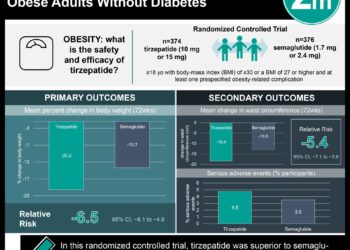Parents’ feeding control practices related to child’s weight and gender
Image: PD
1. Parents of overweight or obese teens reported more food restriction practices than parents of non-overweight teens.
2. Parents of non-overweight teens reported more pressure-to-eat practices than parents of overweight or obese teens.
3. Parents were more likely to use pressure-to-eat practices with sons than daughters.
Evidence Rating Level: 2 (Good)
Study Rundown: Parental feeding practices and attitudes play an important role in shaping their children’s eating behaviors and, consequently, their weight and overall health and wellbeing. Results from this study indicate that parents of overweight and obese adolescents were most likely to report food restriction practices such as “I intentionally keep some foods out of my child’s reach”. In contrast, parents of non-overweight adolescents were most likely to report pressure-to-eat practices such as “My child should always eat all of the food on his/her plate”.
One possible limitation is the cross-sectional design of the study, which does not address directionality of the associations found; it is possible that parental behaviors result from, rather than contribute to, their child’s weight status. Furthermore, self-report bias may have occurred.
Click to read the study, published today, in Pediatrics
Study Author, Katie A. Loth, RD, MPH, talks to 2 Minute Medicine: Division of Epidemiology and Community Health, University of Minnesota.
“Given the high prevalence of weight-related problems (e.g. overweight, disordered eating behaviors) in adolescents and the difficulty parents can encounter in providing a balance of structure and autonomy for their adolescent children, it is necessary to research how the parents can best promote both a healthy weight and healthy weight-related behaviors in their adolescent children.
Our study findings suggest that the use of controlling food-related parenting practices are common among parents of adolescents. Unfortunately, accumulating evidence suggests that the use of controlling food-related parenting practices has a detrimental impact on children’s ability to self-regulate energy intake. This information may be counterintuitive for some parents, making it necessary that health care providers educate and empower parents through anticipatory guidance to promote healthy eating by making nutritious food items readily available within their home, modeling healthy food choices, and encouraging their adolescent’s autonomy in self-regulation of food intake.”
In-Depth [retrospective cohort study]: Two population-based survey studies examined the dietary intake, weight status, and parental feeding practices of 2231 adolescents and 3431 parents. Most parents reported controlling feeding practices with their adolescent children, reporting low-to-moderate pressure-to-eat (score 2.21) and moderate food-restriction (score 2.51) practices. Significantly more mothers of non-overweight (as compared with overweight or obese) adolescent girls agreed that their child should always eat all her food (p < 0.05). Correspondingly, parents of obese teens were more likely to report monitoring their child’s high-fat or sweet intake (p < 0.05). Parents of non-overweight adolescents exhibited the highest pressure-to-eat behaviors (p < 0.01), while parents of obese adolescents exhibited the most food restriction (p < 0.01). Fathers reported more pressure-to-eat practices (girls: p = 0.02; boys: p < 0.01) than mothers. Also, both mothers (p = 0.03) and fathers (p = 0.02) of boys reported higher pressure-to-eat scores than parents of girls.
By Cordelia Y. Ross and Devika Bhushan
More from this author: Social networks play key roles in parental vaccination decisions; Shorter sleep duration associated with increased adolescent BMI; Varicella vaccine provides 14-year protection against childhood chicken pox
© 2013 2minutemedicine.com. All rights reserved. No works may be reproduced without written consent from 2minutemedicine.com. Disclaimer: We present factual information directly from peer reviewed medical journals. No post should be construed as medical advice and is not intended as such by the authors or by 2minutemedicine.com. PLEASE SEE A HEALTHCARE PROVIDER IN YOUR AREA IF YOU SEEK MEDICAL ADVICE OF ANY SORT. Content is produced in accordance with fair use copyrights solely and strictly for the purpose of teaching, news and criticism. No benefit, monetary or otherwise, is realized by any participants or the owner of this domain.






